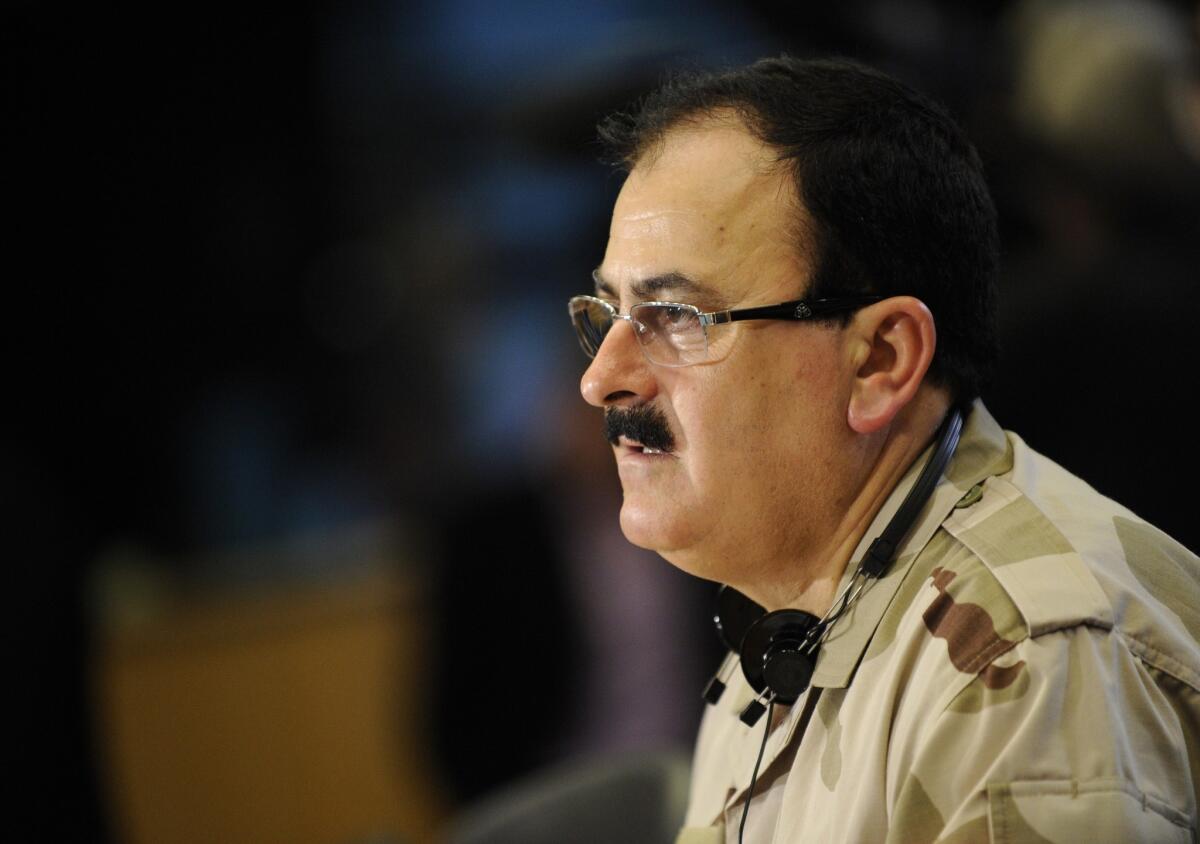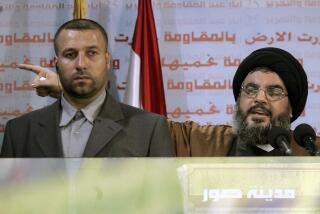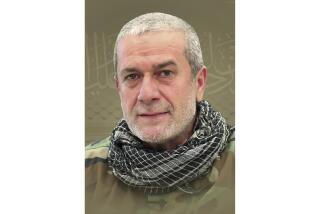Syrian rebel army fires commander many considered ineffective

BEIRUT--The head of the Free Syrian Army, the U.S.-backed assemblage of ostensibly moderate Syrian opposition forces, has been removed from his post, according to a statement Sunday from the rebel command’s Supreme Military Council.
Brig. Gen. Salim Idriss is to be replaced by Brig. Gen. Abdul-Ilah Bashir Al-Noeimi, a rebel field commander in southern Syria, the statement said. The move appeared to be part of a broader shakeup of the rebel leadership as the Syrian conflict nears the three-year mark with little sign of a resolution.
Idriss, a high-profile defector from the Syrian army, served as the public face of the Free Syrian Army for the past 14 months and was a key intermediary with the United States and other nations providing cash and other aid to the rebels. Idriss was also frequently featured in interviews in the Western and regional press. However, some battlefield commanders and other critics regarded him as a rear-guard official with little impact on military strategy.
The decision to sack Idriss comes at a time of uncertainty and likely redirection for the Western-backed FSA, which has long been a loose franchise operation. The FSA is but one part of a heavily fragmented rebel force fighting to topple the government of Syrian President Bashar Assad. It was never clear how many troops or brigades actually reported to Idriss’ leadership, or whether he had much power to direct actions in the field.
On the battlefield, Islamic extremist factions, some linked to Al Qaeda, have militarily eclipsed the FSA, a development viewed as extremely troubling in Washington. Last December, Idriss had to flee his headquarters in northern Syria when an Islamic rebel group seized FSA storage depots and other facilities. The humiliating episode prompted Washington to freeze shipments of “non lethal” assistance to the FSA, officials said, though aid has since been restored.
More recently, the FSA and allied forces have been reported to be battling against the extremist Islamic State of Iraq and Syria, a powerful rebel group seeking the creation of an Islamic emirate in the two countries.
The official statement announcing Idriss’ removal hinted at dissatisfaction with Idriss’s performance.
“Because of the [setbacks] that the General Staff has suffered over the past few months, and due to the difficult circumstances facing the Syrian revolution, and to restore the hierarchy of the leadership, the Supreme Military Council has unanimously decided... to remove Salim Idriss in his role as Chief of Staff,” the opposition general staff said in a video announcement on its web site.
Idriss, an East German-trained electronics professor and former lecturer at a Syrian military academy, was viewed by many as an ineffectual leader. He was more often seen soliciting aid and in press interviews than on the battlefield.
The choice of his successor may represent a shift in opposition military strategy and could signal a restructuring of the FSA. The change in leadership comes as the Obama administration is weighing new options in Syria after two rounds of peace talks in Geneva have failed to yield a breakthrough. President Obama met Friday with Jordanian King Abdullah II, one of Washington’s closest Mideast allies, and Syria was high on the agenda.
While Idriss was based in Turkey, adjacent to rebel-held areas in northern Syria, his replacement, Bashir, is from the southern province of Quneitra, close to the Jordanian border. Recent reports have indicated that Saudi Arabia and the United States are stepping up support for anti-government rebels infiltrating from Jordan into southern Syria, which is relatively close to Damascus, the capital.
“You have... the apparent decision by Saudi Arabia and others to go at this from Jordan and southern Syria,” Aron Lund, editor of the Carnegie Endowment’s Syria in Crisis website, said via email. “[It] might not be a coincidence that Bashir is in Quneitra, since you have rebels advancing there right now with fresh supplies of U.S. money and Saudi weapons.”
Ahmad Jarba, who heads the Syrian National Coalition, an umbrella group that includes the FSA and the Supreme Military Council, was reported to have visited rebel positions in the northern province of Idlib this past weekend. Whether his ’ trip had anything to do with Idriss’ removal was not clear.
Twitter: @Mcdneville
Bulos is a special correspondent.
More to Read
Sign up for Essential California
The most important California stories and recommendations in your inbox every morning.
You may occasionally receive promotional content from the Los Angeles Times.










